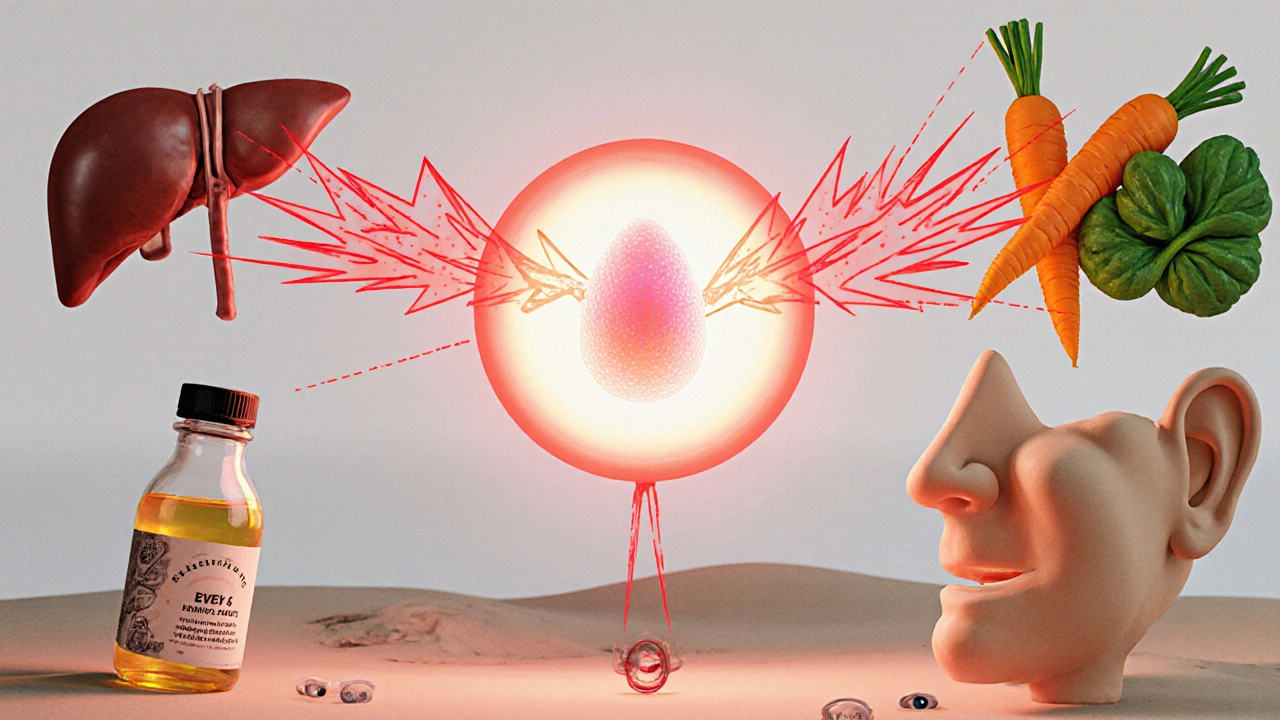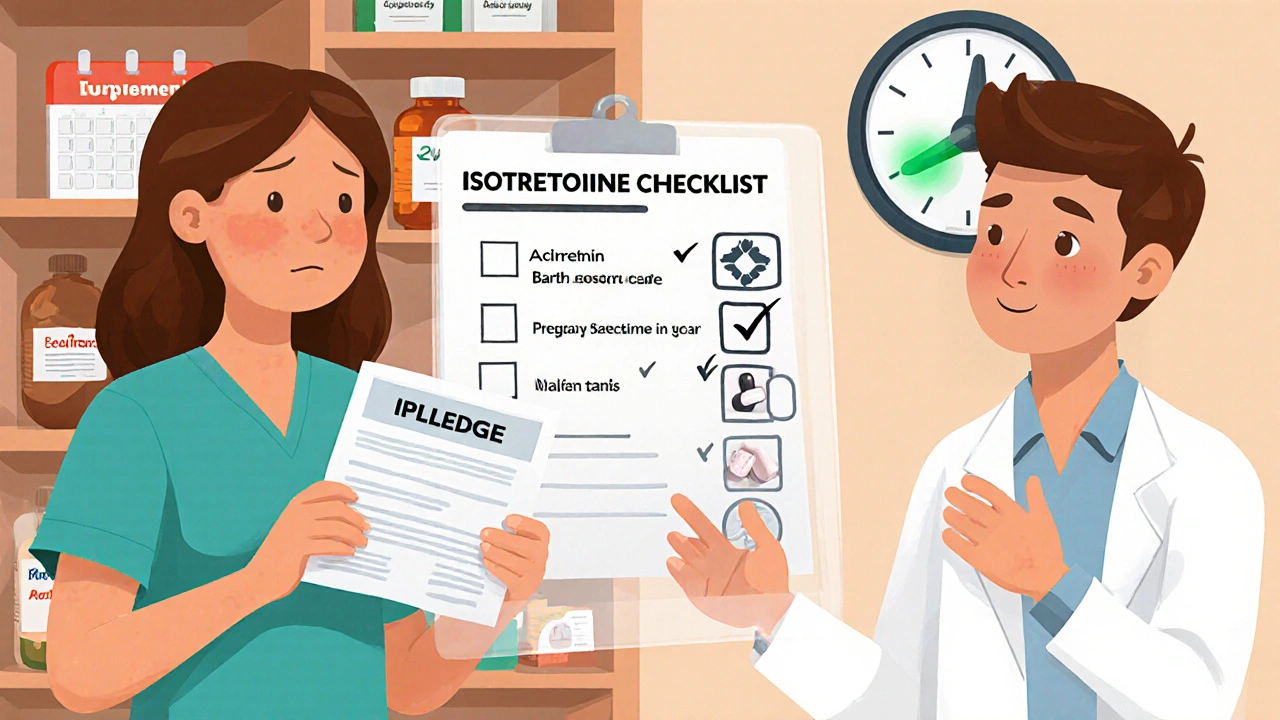Vitamin A Intake Calculator for Pregnancy
This calculator helps you determine if your vitamin A intake exceeds the safe limit of 10,000 IU (3,000 μg RAE) during pregnancy.
Your Vitamin A Sources
Your Vitamin A Intake
When you hear "vitamin A," you probably think of healthy skin, good vision, or immune support. But what if that same vitamin could cause serious birth defects? It’s not a myth. Retinoids and high-dose vitamin A are among the most well-documented teratogens in modern medicine - substances that can disrupt fetal development and lead to life-altering congenital malformations. This isn’t just about prescription acne drugs. It’s about the supplements you take, the liver you eat, and the prenatal vitamin sitting in your medicine cabinet.
What Exactly Are Retinoids and Vitamin A?
Vitamin A isn’t one thing. It’s a group of compounds with different names and different risks. Preformed vitamin A - like retinol, retinyl palmitate, and retinaldehyde - comes from animal sources: liver, fish oils, dairy, and eggs. These forms are directly usable by your body. Then there’s beta-carotene, a plant-based provitamin A found in carrots, sweet potatoes, and spinach. Your body only converts it to active vitamin A as needed, making it far safer.
Retinoids are synthetic or modified versions of vitamin A. The most famous is isotretinoin (Accutane®), used for severe acne. Others include etretinate, acitretin, and topical tretinoin. These aren’t just stronger versions of vitamin A - they’re designed to bind more tightly to cellular receptors, which makes them more effective for treating skin conditions… and more dangerous during pregnancy.
When Does the Danger Start?
The window of risk is narrow but devastating. The most critical time is between weeks 3 and 5 of pregnancy - before many women even know they’re pregnant. This is when the embryo’s organs are forming: the heart, brain, eyes, ears, and jaws. Retinoids interfere with the genes that control this process, especially the Hox family of genes that act like blueprints for body structure.
Back in 1953, scientist Sidney Q. Cohlan showed that giving pregnant rats massive doses of vitamin A led to offspring with missing eyes, cleft palates, and brains sticking out of their skulls. Human cases followed. Today, we know isotretinoin increases the risk of major birth defects by 20 to 35%. That’s 25 times higher than the baseline rate. And it doesn’t take a lot - as little as 0.5 mg/kg/day can cause damage. For context, a typical daily dose of isotretinoin is around 0.5 to 1 mg/kg.
How Dangerous Is Dietary Vitamin A?
Here’s where things get tricky. Most people think, "I’m not taking Accutane, so I’m safe." But you don’t need a prescription to be at risk. A 3-ounce serving of beef liver contains over 27,000 IU of vitamin A - more than double the upper safety limit for pregnant women. Cod liver oil? One tablespoon can hit 13,500 IU. That’s enough to push you over the edge.
Studies show that women who consume more than 10,000 IU of preformed vitamin A daily during the first trimester have a 2.4-fold higher risk of major birth defects. And here’s the kicker: 78% of prenatal vitamins in the U.S. contain preformed vitamin A - usually retinyl palmitate - averaging 2,565 IU per serving. Multiply that by a supplement you take on top of fortified cereal, milk, or liver, and you’re easily hitting danger zones without realizing it.
Beta-carotene, on the other hand? No such risk. Even at doses up to 180 mg/day (300,000 IU equivalent), studies show no birth defects. The body regulates its conversion to retinol, so it doesn’t build up. If you’re pregnant or planning to be, switching to a prenatal with beta-carotene instead of retinol isn’t just a good idea - it’s a smart safety move.

Topical Retinoids: Are They Safe?
If you’re using tretinoin cream for wrinkles or acne, you might be wondering: "Is this going to hurt my baby?" The short answer: probably not - but caution is still needed.
Unlike oral retinoids, topical forms don’t get absorbed into your bloodstream in meaningful amounts. Studies show plasma levels of tretinoin after normal skin application are below 0.5 ng/mL - too low to cause harm. But here’s the catch: no one can say with 100% certainty that it’s 100% safe. Regulatory agencies still advise avoiding topical retinoids during pregnancy, mostly because of the lack of large-scale human studies. If you’re pregnant and using tretinoin, talk to your doctor. Don’t panic, but don’t assume it’s harmless either.
The iPLEDGE Program: How We Try to Prevent Tragedies
After hundreds of birth defects linked to isotretinoin in the 1980s and 90s, the FDA created iPLEDGE in 2006. It’s not optional. It’s mandatory. If you’re a woman of childbearing potential and your dermatologist prescribes isotretinoin, you must:
- Have two negative pregnancy tests before starting
- Use two forms of birth control simultaneously
- Attend monthly counseling sessions
- Get a new pregnancy test every month
- Only receive a 30-day supply at a time
It sounds extreme. And it is. But it works. In 2002, about 3.7% of women on isotretinoin got pregnant. By 2022, that number dropped to 0.7%. That’s over 80% fewer pregnancies - and likely hundreds of avoided birth defects.
But the system isn’t perfect. A 2021 JAMA Dermatology study found that 68% of pregnancies in women on isotretinoin happened because they didn’t follow the contraception rules. Some didn’t understand the risk. Others thought "I’ll just miss one pill." One Reddit user wrote: "My dermatologist didn’t properly explain the pregnancy risks - I got pregnant 3 weeks after my last dose and had to terminate." That’s not a failure of the drug. That’s a failure of communication.
What About Other Retinoids Like Acitretin and Etretinate?
Isotretinoin isn’t the only problem. Acitretin, used for psoriasis, has a half-life of about 20 hours - but its metabolite can linger for up to two years. That means women must avoid pregnancy for 2 years after stopping the drug. Etretinate? Even worse. It stays in the body for up to 120 days. If you took it in 2020 and got pregnant in 2021, you’re still at risk.
These drugs aren’t used as often as isotretinoin, but they’re still out there. And many doctors - especially general practitioners - don’t know the full timeline. A 2021 American Academy of Dermatology survey found only 58% of general practitioners followed the correct contraception guidelines, compared to 92% of board-certified dermatologists. That gap is dangerous.

What Should You Do If You’re Pregnant or Planning to Be?
If you’re pregnant:
- Stop all oral retinoids immediately - even if you’ve been taking them for weeks.
- Switch your prenatal vitamin to one with beta-carotene, not retinol.
- Avoid liver, cod liver oil, and high-dose vitamin A supplements.
- Check the label: if it says "retinyl palmitate," "retinol," or "vitamin A (as retinol)," it’s risky.
- Call your OB-GYN. Tell them what you’ve been taking.
If you’re trying to get pregnant:
- Stop isotretinoin at least one month before trying - but for acitretin, wait two years.
- Switch to beta-carotene supplements now, not when you get a positive test.
- Ask your doctor to review your entire supplement list, including multivitamins and protein powders.
- Don’t assume "natural" means safe. Liver is natural. So is arsenic.
The Bigger Picture: Why This Keeps Happening
Despite decades of research, this problem persists. Why? Because vitamin A is everywhere - and no one tells you the truth.
Supplement companies don’t have to list vitamin A content in detail on labels. Many don’t. A 2022 ConsumerLab report found 42% of vitamin A supplements exceed the 10,000 IU daily limit recommended for pregnant women. And 73% contain preformed vitamin A, not beta-carotene.
Healthcare providers aren’t always trained to ask about supplements. Patients don’t think to mention them. And when they do, doctors often dismiss them as "just a vitamin." But this isn’t like taking vitamin C. This is like accidentally taking a poison.
There’s also a global problem. In low-resource countries, where contraception access is limited and medication regulation is weak, teratogenic retinoid exposure rates are 8.3 times higher than in the U.S., according to The Lancet Global Health. Women there may not even know what they’re taking - or that it’s dangerous.
What’s Next? Safer Alternatives Are Coming
The good news? Science is catching up. Researchers are developing new retinoid-like drugs that treat acne and psoriasis without crossing the placenta. One compound, LGD-1550, showed promise in animal studies - same effectiveness as isotretinoin, no birth defects. It’s in Phase II trials now.
The Vitamin A Safety Consortium, funded by the NIH, is creating standardized patient education materials. Early results show a 32% improvement in patient understanding after using them. That’s huge.
By 2026, we might see mandatory warning labels on liver and fish oil products. The European Food Safety Authority already reaffirmed the 3,000 μg RAE (10,000 IU) upper limit for pregnant women in 2022. The FDA is considering expanding pregnancy testing requirements to all systemic retinoids.
This isn’t about scaring people. It’s about empowering them with real knowledge. Vitamin A saves lives. But too much - especially the wrong kind - can end them.
Can I take vitamin A while pregnant?
You can, but only in safe amounts and forms. The upper limit is 10,000 IU per day of preformed vitamin A (retinol, retinyl palmitate). But it’s safer to avoid it entirely and choose prenatal vitamins with beta-carotene instead. Beta-carotene has no known teratogenic risk, even at high doses. Avoid liver, cod liver oil, and high-dose supplements.
Is isotretinoin (Accutane) the only dangerous retinoid?
No. Etretinate and acitretin are also highly teratogenic, and their effects last longer. Etretinate can stay in your body for up to 120 days, and acitretin’s metabolites can linger for up to two years. That means women must avoid pregnancy for 2 years after stopping acitretin. All oral retinoids carry risk - not just isotretinoin.
Are topical retinoids like tretinoin cream safe during pregnancy?
Topical retinoids are considered low risk because very little is absorbed into the bloodstream - levels are usually below detectable limits. But because there’s no large-scale human safety data, most doctors still recommend avoiding them during pregnancy. If you’re using them and find out you’re pregnant, stop immediately and talk to your doctor. Don’t panic, but don’t ignore it.
How do I know if my prenatal vitamin has dangerous vitamin A?
Check the ingredient list. If it says "retinol," "retinyl palmitate," or "vitamin A (as retinol)," it’s preformed vitamin A and carries risk. Look for "beta-carotene" or "provitamin A (as beta-carotene)" instead. Many prenatal vitamins now offer beta-carotene-only versions - they’re just as effective for your health without the danger.
What if I took vitamin A before I knew I was pregnant?
If you took a standard prenatal vitamin (under 10,000 IU of retinol), your risk is very low. If you took high-dose supplements, liver, or cod liver oil, talk to your OB-GYN. An ultrasound at 18-22 weeks can check for major structural abnormalities. Most women who unknowingly took vitamin A during early pregnancy have healthy babies - but it’s important to get monitored. Don’t assume the worst, but don’t skip the checkup.
Can I take beta-carotene instead of vitamin A while pregnant?
Yes, and it’s the safest choice. Beta-carotene is converted to vitamin A only as your body needs it, so it doesn’t build up to toxic levels. Studies show no birth defects even at doses of 180 mg/day. Most prenatal vitamins now offer beta-carotene as an alternative - switch to one if yours doesn’t.
What foods should I avoid if I’m pregnant?
Avoid liver (beef, chicken, pork), cod liver oil, and any supplements with high-dose preformed vitamin A. Even one serving of beef liver can give you more than 27,000 IU - far above the safe limit. Other dairy and egg sources are fine in normal amounts. Stick to fruits and vegetables rich in beta-carotene - carrots, sweet potatoes, spinach, kale - for safe vitamin A.
How long after stopping isotretinoin can I get pregnant?
Wait at least one month after your last dose. But if you took acitretin, wait two years. Isotretinoin leaves your system in about 10 days, but its effects on fetal development can still occur if conception happens too soon. The iPLEDGE program requires one month of contraception after stopping isotretinoin - follow it exactly. For acitretin, the 2-year wait is non-negotiable.


Rachel Villegas
November 22, 2025 AT 09:00This is one of those posts that should be mandatory reading for every woman planning a pregnancy. I didn't know liver had that much vitamin A - I thought it was just a superfood. Now I'm checking every supplement label in my cabinet. Thanks for the clarity.
giselle kate
November 24, 2025 AT 08:28Of course the FDA doesn't do enough. In America we're told to take supplements like candy while the rest of the world knows better. If you want to avoid birth defects, stop trusting corporations and start reading labels. Beta-carotene isn't some hippie alternative - it's the only safe option. Wake up, people.
Emily Craig
November 25, 2025 AT 16:40So let me get this straight - I can eat a whole bag of carrots and be fine but one bite of liver and I'm basically playing Russian roulette with my baby's face? 😅
Also why does every prenatal vitamin still use retinyl palmitate like it's 1998? I switched to beta-carotene last year and my OB didn't even blink. Maybe because she's not paid by vitamin companies?
Karen Willie
November 26, 2025 AT 23:11Thank you for sharing this. I'm a nurse and I see so many women who don't realize how easily they can overdose on vitamin A. It's not just Accutane - it's the multivitamins, the energy bars, the protein powders. I always ask patients about supplements during intake, but most don't think it's relevant. This post could save lives. Please share it with anyone you know who's trying to conceive.
Leisha Haynes
November 27, 2025 AT 00:06My dermatologist told me to stop tretinoin when I got pregnant and I was like 'but it's just cream' and she said 'yeah but so is poison if you lick it enough'... point taken
Also switched my prenatal to beta-carotene - turns out my old one had 5000 IU of retinol. That's like a whole liver in pill form. Yikes.
Amy Hutchinson
November 28, 2025 AT 07:59Wait so if I ate liver last week and just found out I'm pregnant am I gonna have a baby with no eyes?? 😭